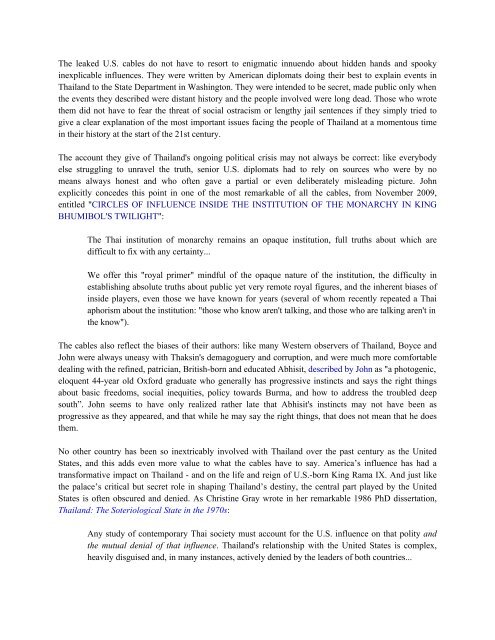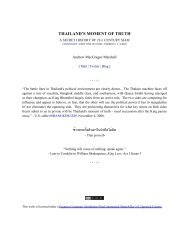THAILAND'S MOMENT OF TRUTH - ZENJOURNALIST
THAILAND'S MOMENT OF TRUTH - ZENJOURNALIST
THAILAND'S MOMENT OF TRUTH - ZENJOURNALIST
You also want an ePaper? Increase the reach of your titles
YUMPU automatically turns print PDFs into web optimized ePapers that Google loves.
The leaked U.S. cables do not have to resort to enigmatic innuendo about hidden hands and spooky<br />
inexplicable influences. They were written by American diplomats doing their best to explain events in<br />
Thailand to the State Department in Washington. They were intended to be secret, made public only when<br />
the events they described were distant history and the people involved were long dead. Those who wrote<br />
them did not have to fear the threat of social ostracism or lengthy jail sentences if they simply tried to<br />
give a clear explanation of the most important issues facing the people of Thailand at a momentous time<br />
in their history at the start of the 21st century.<br />
The account they give of Thailand's ongoing political crisis may not always be correct: like everybody<br />
else struggling to unravel the truth, senior U.S. diplomats had to rely on sources who were by no<br />
means always honest and who often gave a partial or even deliberately misleading picture. John<br />
explicitly concedes this point in one of the most remarkable of all the cables, from November 2009,<br />
entitled "CIRCLES <strong>OF</strong> INFLUENCE INSIDE THE INSTITUTION <strong>OF</strong> THE MONARCHY IN KING<br />
BHUMIBOL'S TWILIGHT":<br />
The Thai institution of monarchy remains an opaque institution, full truths about which are<br />
difficult to fix with any certainty...<br />
We offer this "royal primer" mindful of the opaque nature of the institution, the difficulty in<br />
establishing absolute truths about public yet very remote royal figures, and the inherent biases of<br />
inside players, even those we have known for years (several of whom recently repeated a Thai<br />
aphorism about the institution: "those who know aren't talking, and those who are talking aren't in<br />
the know").<br />
The cables also reflect the biases of their authors: like many Western observers of Thailand, Boyce and<br />
John were always uneasy with Thaksin's demagoguery and corruption, and were much more comfortable<br />
dealing with the refined, patrician, British-born and educated Abhisit, described by John as "a photogenic,<br />
eloquent 44-year old Oxford graduate who generally has progressive instincts and says the right things<br />
about basic freedoms, social inequities, policy towards Burma, and how to address the troubled deep<br />
south”. John seems to have only realized rather late that Abhisit's instincts may not have been as<br />
progressive as they appeared, and that while he may say the right things, that does not mean that he does<br />
them.<br />
No other country has been so inextricably involved with Thailand over the past century as the United<br />
States, and this adds even more value to what the cables have to say. America’s influence has had a<br />
transformative impact on Thailand - and on the life and reign of U.S.-born King Rama IX. And just like<br />
the palace’s critical but secret role in shaping Thailand’s destiny, the central part played by the United<br />
States is often obscured and denied. As Christine Gray wrote in her remarkable 1986 PhD dissertation,<br />
Thailand: The Soteriological State in the 1970s:<br />
Any study of contemporary Thai society must account for the U.S. influence on that polity and<br />
the mutual denial of that influence. Thailand's relationship with the United States is complex,<br />
heavily disguised and, in many instances, actively denied by the leaders of both countries...




